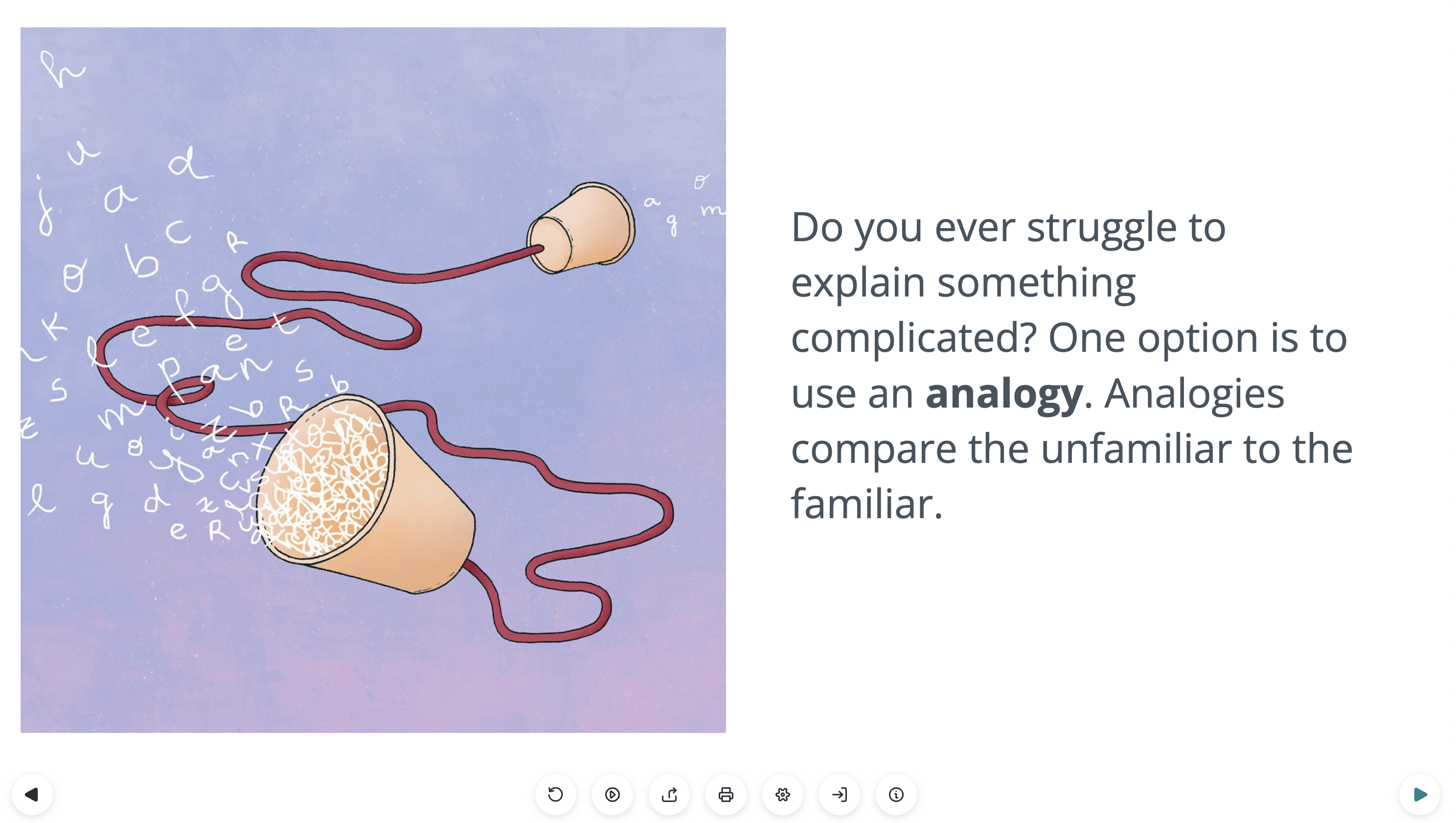So you’ve decided you want to be a SciComm-er? Whether you’ve been following our Why SciComm? Series, participating in our SciComm program or you’ve just found this post, we are excited for the journey you’re taking!
You may be asking: Where do I start? How do I begin building my portfolio? How do I get plugged into SciComm networks? What kind of SciComm jobs are there? What do I put on my résumé? Well, we bring you these questions and more in our new SciComm Tips Series. Our first series of tips is focused on jobs for early-career SciCommers. Read “11 Do’s for Getting a SciComm Job” now for a brief overview and introduction to our SciComm Job Tips series.

Building Your SciComm Portfolio
It’s never too early to start your portfolio! In our series, we’ll bring you many SciComm topics, but we wanted to start with this one because it’s likely one of the first things to think about as you move into the SciComm space. You can work on other things at the same time, but you should be working on building your portfolio—starting now if you haven’t already! Your SciComm portfolio helps tell the story of YOU as a SciCommer. Make sure you’re telling the story you want to tell. We hope this blog post helps you get started!
Learn From Those Before You
Start, if you haven’t already, reading/listening/viewing the SciComm of others. Find SciCommers who you like and are doing the type of SciComm that you would like to be doing. Why do you like what they’re communicating? What about their SciComm is intriguing to you? What techniques are they using? Consider using some of the same techniques. Please note that I am NOT advising you to plagiarize or mimic what is already being done. This is both unethical and won’t help you create a space for yourself in the SciComm space. Instead, I am asking you to observe the techniques and learn about what does and doesn’t work from those before you. I am also asking you to observe to help you determine your SciComm goals.
What Are Your SciComm Goals?
This is where your “why” comes in. Why do you want to communicate science? Actually writing down or saying your “why” aloud can help solidify your goals and guide you where you go next. For example, if you want to help inform science policy with your SciComm efforts, you may not be trying to gain experience in institutional SciComm. However, no experience is bad experience if the opportunity that comes your way at first is not exactly where you want to eventually land.
We’re going to have a whole post on the different kinds of SciComm careers, and you can check out our Why SciComm? Series to read about some real-life SciCommers. However, here are a few titles of SciComm positions to pique your interest if you don’t know where to start: science writer, social media coordinator, public information officer, content creator, copyeditor, copywriter, media relation specialist, communications specialist, scriptwriter, and more!
Your goals can and should be flexible, but you should have an idea of what your goals are with your communication, who your audience is, and what kind of SciComm you’re interested in doing… then you can start making your own content!
Some Things Must Be Experienced
The most obvious (and maybe most important!) part of building your SciComm portfolio is gaining some experience. Understandably, this can be daunting for SciCommers just starting out. The good news is that there are ways to gain experience besides writing for The Washington Post or Science (but pitch these places if your heart desires—shoot for the stars!).
You can start a blog, podcast, SciComm Instagram, or a newsletter—and more! What interests you? Think back to your SciComm goals. What do you want to communicate about? How do you want to do it and through what mediums? Now think about those things and what kind of SciComm space you can create to help your portfolio.
- Here are a few examples of some SciComm blogs: Bacterial World, The Female Scientist, and From the Lab Bench.
- Not sure what kind of SciComm you could do on Instagram? Check out: @jordanbharrod, @steph.compton.nutrition, and @science.sam.
- Some of my favorite SciComm podcasts include: Ologies, The Story Collider, and Bloom and Grow Radio.
- And finally, a newsletter can be another way to stay up to date with the science and SciComm world while still creating content. Here are some examples: The SciCommer, Science Writing News Roundup, The Polymerist.
Get an internship or look in your community for opportunities. Contact local organizations, museums, newspapers or other news outlets to see if they could use any help with their communication efforts. Are there any festivals or outreach events happening in your community that you could volunteer at? Remember, all of your experience doesn’t always have to be science-related to be good experience!
You likely already have some things you can use. You can’t use your academic papers because the audience of these works is not the same audience of most SciComm efforts. However, if you’re coming from a science or academic background, consider what else you have done. Have you presented your research? Participated in a 3-minute thesis competition? Blogged for your college or academic department? The possibilities are endless, and I could never describe all of the experiences of those interested in entering SciComm. Get creative. That booth you ran for 8 hours to recruit incoming students to your science department? Experience. Have fun reflecting!
Most importantly, keep writing, recording, drawing, or presenting. Even when you think that no one is looking at or listening to your SciComm, keep going!
Read About SciComm, too!
Places like The Open Notebook, Lifeology SciComm program and the Alan Alda Center for Communicating Science are great online resources. You can also check out books such as “The Craft of Science Writing,” “Science Writers’ Handbook” and “Escape from the Ivory Tower: A Guide to Make Your Science Matter.” We will have a whole post on SciComm resources in the future, so stay tuned. You’ll want to remain connected to these resources and more throughout your Scicomm career, not just at the beginning of building your portfolio.
Who Do You Know?
While you’re building your portfolio, network! On Twitter, engage with hashtags (e.g., #SciComm, #SciCommunity and #ScienceCommunication), follow SciComm organizations and accounts (e.g., @scicommtrainers, @scicommart, @AGU_SciComm, et.c) and connect with other SciCommers, too! Some of my favorite SciCommers to follow on Twitter are Raven the Science Maven and Samantha Yammine. You can network on other platforms such as LinkedIn and Instagram. In-person and virtual conferences are also great places to connect with other SciCommers.
Consider asking for an informational interview. Remember that SciComm you’ve been reading? That person that you really like the way they write something or you love their podcast? Reach out to them! Tell them that you enjoy their content and that you want to learn more about them and their career—they will likely be flattered and more than willing to talk with you some more!
Where Should my Portfolio Live?
Consider a website where you can house all your content and highlight the most important works. You can have your CV on this website, too. Maybe a blog lives on this site as well. Don’t be afraid to showcase your uniqueness on your website. You can host your blog at places like WordPress.com or Wix or choose a portfolio site like clippings.me or Dribble, depending on the type of SciComm you’re interested in. Use LinkedIn, too. Put all the information and details that you can to have a complete and professional-looking profile. If you also have a website or an online portfolio, you can link it there. Here are some examples of portfolios from some Lifeology community members:
- https://www.clippings.me/raeesa
- https://meredithschmehl.com/writing
- https://www.rikhiroy.com/science-communication
- http://www.highlight-communications.org/
- http://www.esporascicomm.com/
- https://dinnrpl8d.wixsite.com/aishwaryaviswamitra
- https://www.jacelyndesigns.com/work
- http://www.emma-melchor.com/
Beyond the Portfolio
Think about the “non-content” things that accompany your portfolio, too!
Go to a conference. Like we mentioned, this can be a huge help for networking. It can also help you gain knowledge about and show interest in the field.
Pursue other passions. Don’t lose yourself in the process of trying to build your SciComm portfolio. Do the other things that you’re passionate about such as hobbies, family time, volunteering, etc. These experiences help make you an employable SciCommer, too!
Seek leadership. Are you or have you been a lead on a project? Part of a planning committee for a community event or conference? Held a position on a board or in charge of a budget? Consider what you have done and consider what you can do moving forward to ripen this area.
We hope that this blog post has inspired you to continue down the SciComm path and given you some confidence for how to move forward with building your portfolio. Stay tuned for the next blog post in the series. In the meantime, check out “11 Do’s for Getting a SciComm Job,” our upcoming webinars or our SciComm program courses. Also, consider joining our Slack community if you haven’t already. Happy SciComming!




